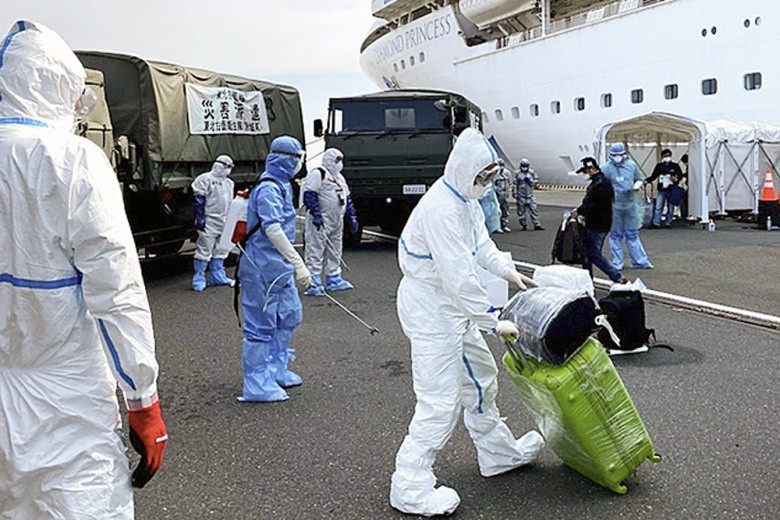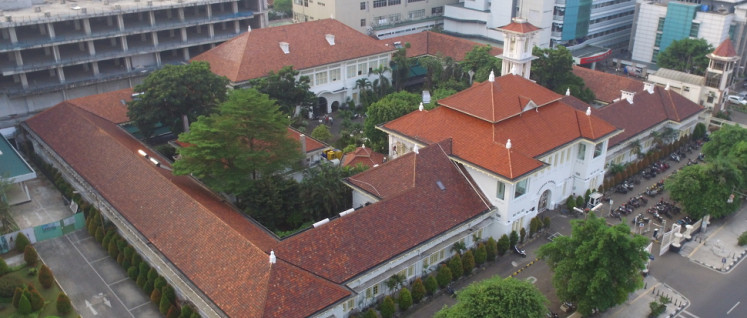Popular Reads
Top Results
Can't find what you're looking for?
View all search resultsPopular Reads
Top Results
Can't find what you're looking for?
View all search resultsIndonesian scientists want government to get ‘professional help’ in fighting COVID-19
Scientists say the government is lacking a crucial element in the war against the virus: transparency.
Change text size
Gift Premium Articles
to Anyone
 Welcoming spray: Medical workers stand ready to spray disinfectant on 69 Indonesian crew members and passengers of the Diamond Princess cruise ship as they alight in Yokohama, Japan, on Monday. The Indonesians tested negative for COVID-19 but will be quarantined for observation on Sebaru Kecil Island, north of Jakarta. (Antara/Indonesian Embassy in Tokyo)
Welcoming spray: Medical workers stand ready to spray disinfectant on 69 Indonesian crew members and passengers of the Diamond Princess cruise ship as they alight in Yokohama, Japan, on Monday. The Indonesians tested negative for COVID-19 but will be quarantined for observation on Sebaru Kecil Island, north of Jakarta. (Antara/Indonesian Embassy in Tokyo)
T
he government has stepped up its efforts to contain the coronavirus disease 2019 (COVID-19) by tightening health screenings at borders and testing more people after confirming two cases in a Jakarta suburb over the weekend.
Scientists, however, say there is still a crucial element lacking in the war against the virus: transparency.
A number of scientists have highlighted the importance of involving more people, including independent scientists, in the handling of the virus outbreak, saying it is essential that health authorities work effectively and scientifically.
Ahmad Utomo, a principal investigator at the Stemcell and Cancer Institute in Jakarta, has said that how the authorities are conducting testing is not transparent and not helping the public understand the situation.
The government, he said, needed to “write in detail about the sample collection, preservation, transport and quality control.”
“And if they are going to write a [scientific] paper [on the issue], they must disclose what brand they are using for the PCR testing,” he told The Jakarta Post on Wednesday, adding that China's Centers for Disease Control and Prevention had done exactly that.
“Paper publications like the ones in China showed the details of the outbreak, complete with molecular genetic data of the virus.”
The Health Ministry has posted updates about the COVID-19 situation at infeksiemerging.kemkes.go.id. In its latest update, posted on March 4, the ministry mostly explains the global situation of the outbreak and only spares one paragraph (or one pointer) to explain the domestic situation.
The links to the previous updates are all broken.
Indonesia has reported two confirmed cases in the country, even though the government itself has admitted that it was unable to detect infected people since they showed no symptoms and that the incubation period had been extended to more than 14 days.
Critics have said Indonesia should have reported more cases but the government, which claims to have conducted the lab tests according to the WHO standards, has insisted that the number of confirmed cases has not changed.
Achmad Yurianto, a government spokesman for the handling of the virus outbreak, said Indonesia had tested 168 samples as of Wednesday. “Two of them, case one and case two, came back positive with COVID-19. We are still studying the 10 other samples. The rest are negative,” he said.
When asked about the Polymerase Chain Reaction (PCR) test equipment, Yurianto said: “I will not tell you the name of the brand.”
Utomo deplored Yurianto’s response, saying that information regarding the test kit was critical to allow independent parties review its reliability. Some test kits, he said, could be faulty, referring to the ones used by the US Centers for Disease Control.
After insisting that its Jakarta laboratory alone could conduct testing, the ministry decided to let local laboratories in 10 major cities conduct throat swab tests for COVID-19. However, it has yet to allow other scientific organizations, including from universities, conduct testing.
The government argued that such a policy was redundant, saying that scientists had been consulted with in the formulation of the government’s policy, including the testing system. “It doesn’t matter where the testing is conducted,” he said, adding that what mattered was the scientists’ contribution to the crisis management system.
Read also: Calls mount for revival of national outbreak committee over coronavirus fears
The building of Eijkman Institute in Jakarta (Eijkman Institute/File)Herawati, the deputy for fundamental research at Eijkman Institute, said the institution had all the equipment needed to conduct testing but the government had yet to seek its assistance with the testing of the suspected coronavirus patients.
When the avian influenza outbreak occurred, the government immediately asked Eijkman to also help with the testing of samples from suspected patients, she claimed.
Indonesia, she said, should follow Singapore, where the government and universities are working together to conduct testing for COVID-19.
Indonesia, she said, might be underreporting confirmed cases.
“[The two positive cases] I think are just the tip of the iceberg. We have to do more tests. Not because we want to get more patients but we have to make sure that we are ready, our abilities, facilities and everything for pandemic preparation,” Hera said.
When asked about whether having local labs do the testing was enough, Hera said: “The key is to have an independent laboratory under the command of the Health Ministry for comparison. This is to strengthen transparency,” Hera added.
Ahmad concurred with Hera, saying that the government needed to get “professional help”. “At least seek help to conduct supervision. We have many world-class virologists.”
Bayu Krisnamurthi, who headed the National Committee for Avian Flu Control and Pandemic Preparedness (Komnas Flu Burung) between 2006 and 2010, also highlighted the importance of an independent laboratory for testing.
"It is important to confirm. This examination laboratory has two critical functions, to identify whether the patient is indeed infected with the virus and whether the virus is still the same, or has it mutated and even to trace the origin of the virus," he said.










